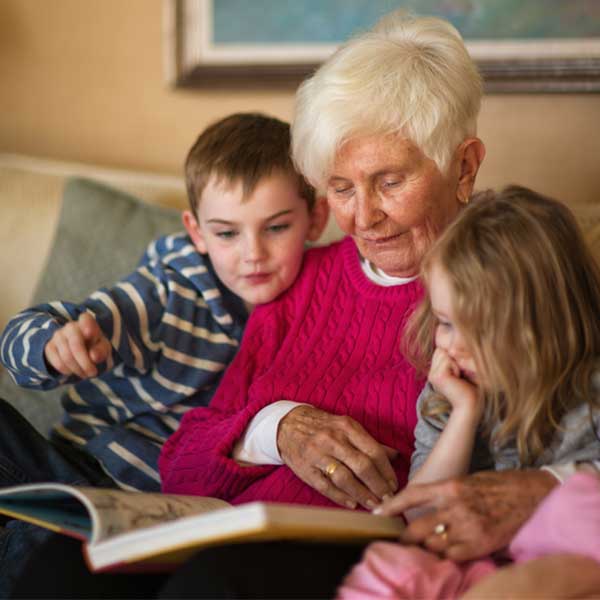
Contributed by Haley Burress
Caring for your aging parent can be full of challenges and meaningful moments. If you add raising children into the mix, certain situations can get even more difficult to handle. If you are struggling with how to teach children about dementia, or why Grandma is confused, you are not alone. Over five million people currently live with Alzheimer’s disease and this number only increases when adding in the older adults with other types of dementia. Teaching your kids, or other children in your family, about dementia can be challenging. However, it can also be a positive shifting point in their relationship with their grandparent. Knowledge is power, right? So empower your kids by learning how to teach children about the dementia process. Here are a few tips to get you started.
Don’t shy away from questions.
Kids are naturally inquisitive, so they might start to notice that Grandma forgets a name or two after a few visits. If your children start to ask questions, don’t brush them off or switch the subject because you don’t feel ready to talk about it yet. So much of how to teach children about dementia relies on you being honest and vulnerable. If you don’t know the answer to their question, be honest and tell them as much. Their questions can be a great start to a conversation about what is happening with Grandma.
Answer in age appropriate terms.
If your five year old asks why Grandma can’t remember how to make her famous chocolate chip pancakes, answer him in terms that he can understand. In contrast, if your 16 year old wonders why Grandma needs an in home health aide a few hours per week, answer him appropriately as well. You know your kids best, so be honest and realistic in terms that they can relate to. When considering how to teach children about dementia, it is good to tell the kids that Grandma’s memory is not very good and it will keep getting worse. This way, you are setting up realistic expectations for this long process.
Suggest different ways to connect.
Your kids might be struggling to connect with Grandma now that she is forgetful or confused. This is normal; sometimes even adults struggle to connect with an aging loved one. Instead of forcing your children to continue with their regular traditions with Grandma, suggest new ways for them to connect. Maybe your five year old can snap green beans in the kitchen with Grandma watching on, or your 16 year old could read aloud to her. The activities might change, but the connection will stay. That is the most important part. Remember, when learning how to teach children about dementia, never force the interaction. This can cause resentment or even fear from your kids. Foster a different yet meaningful connection.
Reinforce the love.
No matter how confused Grandma gets, her heart will always love those important to her. This fact is especially important to reinforce to kids, so be sure to tell them frequently. Talk about how much Grandma used to brag about her grandkids or your favorite stories about the kids and Grandma from younger years. These stories are important for your children to hear and will help them grow up with a well-rounded memory of Grandma.
Use books.
Depending on your child’s age, you can pull age appropriate literature from your local library or the Alzheimer’s Association to help start a conversation or give a new point of view. Older kids can get a lot of information from books such as Still Alice or Dancing with Rose. Younger kids can enjoy books like Still My Grandma or The Memory Box. With younger children, consider reading the book and then following up later with a coloring session or puppet show that the child leads. It is often in these moments of free play that a concern or question finds its way out.
It isn’t easy to tell your kids about dementia, especially since you are likely in the middle of many different emotions yourself. Being a parent is hard work, but with a little honesty and vulnerability, you can find beauty in even this situation. Watching the intergenerational relationship between your kids and parents will last well into the dementia process and will be a gift to everyone.

